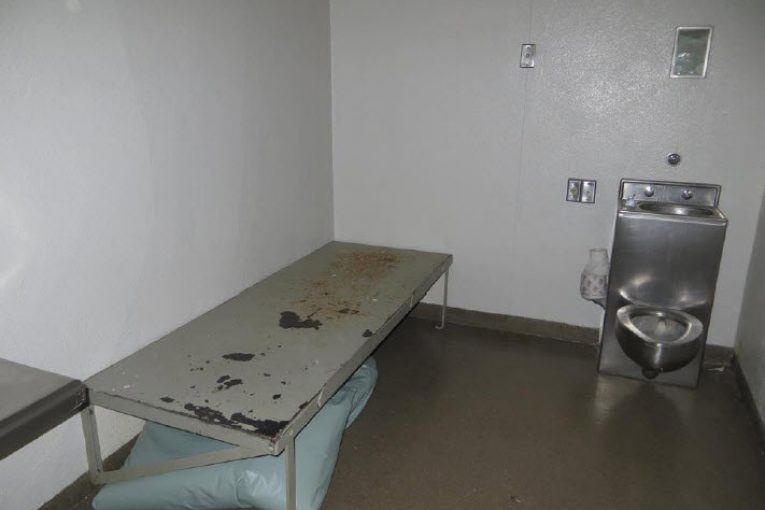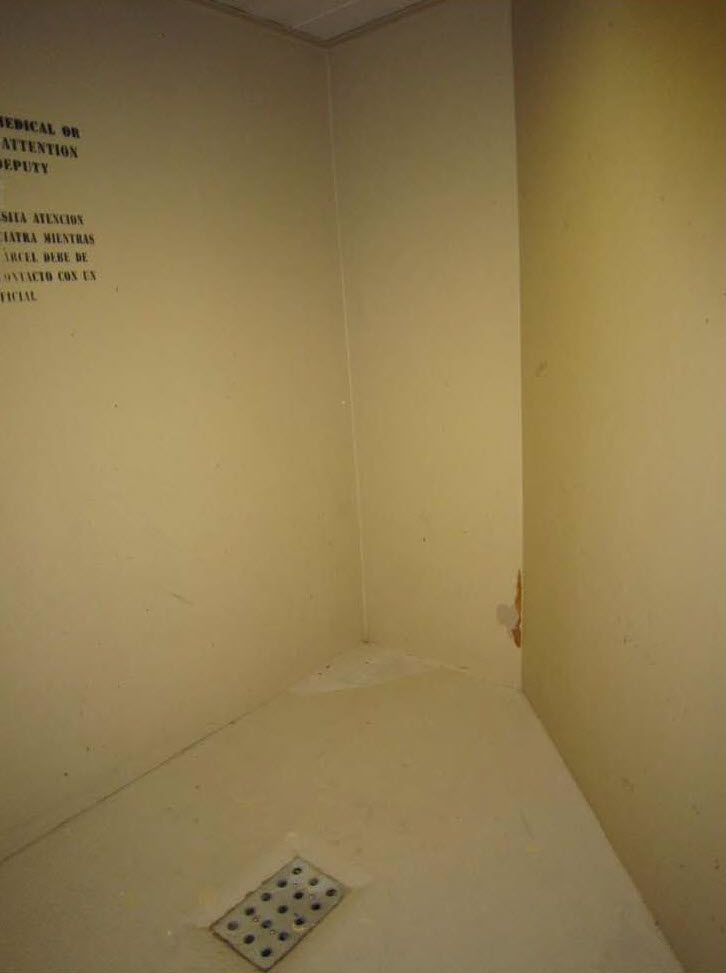

By Crescenzo Vellucci
Vanguard Sacramento Bureau
SACRAMENTO – A motion for summary judgment was filed Tuesday by Plaintiffs’ counsel – in effect, asking for a win without a trial – in a massive class action civil rights lawsuit designed to end the use of solitary confinement and stop other “inhumane” practices at Sacramento County jails, according to legal filings provided the Davis Vanguard.
Lawyers from the Prison Law Office, Disability Rights California, and Cooley LLP are asking the U.S. District Court, Eastern District of California, Sacramento Division, for summary judgment, or at least a permanent injunction to provide relief for prisoners with serious mental illness, and denial of adequate healthcare for all those held in the jails.
The federal lawsuit, filed in July of 2018, targets not only the general treatment – or lack thereof for those with serious illness – of prisoners but specifically the solitary confinement practices where “hundreds of people (are locked) alone in small, locked cells for 23.5 hours or more per day,” according to the lawsuit.

People in “psychiatric crisis” are often left untreated for long periods of time, the Plaintiffs claim, noting that some are stuck in extremely small concrete cells with only a grate in the floor as a toilet; others wait – semi-naked – for days for treatment in “multi-purpose” rooms.
Experts, according to the lawsuit, hired by Sacramento County have described the County’s solitary confinement practices as “dramatically out of step with emerging national standards and practices.” At least three people have died by suicide in “Total Separation” solitary confinement since the experts made this finding.
“Defendant’s (Sacramento County) practice of holding people it knows to be seriously mentally ill in solitary confinement for months or years at a time plainly violates the Eighth and Fourteenth Amendments,” charged the motion of summary judgment.
Citing a multitude of cases from higher courts, the Plaintiffs’ lawyers said constitutional rights are being violated “by warehousing many people with serious mental illness on Total Separation status, putting them at risk of psychological and physical harm, including death.”
Total Separation confines Sacramento Jail prisoners – many of them not convicted of any crime and just waiting for their court date – for weeks, months and sometimes many years without social contact.
“The conditions in Sacramento County’s solitary confinement units are harmful, dangerous, and unnecessary. The County must act quickly to end the use of solitary confinement for people with serious mental illness and greatly expand the amount of time people are allowed to spend outside of their cells,” said Margot Mendelson, staff attorney at the Prison Law Office, in a statement.
In one example cited by the Plaintiff lawyers, Goldyn Cooper said she was on total separation (T-Sep) for about two and one-half months, and feels “trapped, like an animal. Sometimes I am only offered time out of my cell late at night. I feel hopeless.”
Disability Rights California attorney Tifanei Ressl-Moyer said Cooper isn’t alone.
“These serious problems are longstanding, and are the result of the dangerous over-representation of people with mental health needs who are incarcerated at the jail and the County’s failure to provide the resources to deliver clinically necessary treatment to them. An adequate remedy…is urgently needed,” she said.
“Defendant’s failure to provide adequate treatment for the scores of class members with serious mental illness violates the Eighth and Fourteenth Amendments. To provide minimally adequate treatment of a  serious mental health condition, officials must provide ‘a system of ready access’ to mental health care,” argued the lawyers in the filing.
serious mental health condition, officials must provide ‘a system of ready access’ to mental health care,” argued the lawyers in the filing.
Citing from a 20-year-old Madrid v. Gomez case, lawyers said the court “found that placing people with
mental illness in solitary confinement is the mental equivalent of putting an asthmatic in a place with little air to breathe.’”
“With this motion, we hope to vindicate the rights of a particularly vulnerable population that is at a heightened risk of decompensating in the County of Sacramento’s custody. Freedom from prolonged and oppressive solitary confinement and adequate access to mental health care are critical components of the jail’s ability to pass constitutional muster,” said Cooley Partner Jessica Valenzuela Santamaria in a news release.
If the court now doesn’t grant summary judgment for Plaintiffs, their lawyers are asking for a preliminary injunction to stop immediate harm from continuing in Sacramento County jails.
“(P)reliminary injunctive relief is necessary because: (1) Plaintiffs are likely to succeed
on the merits; (2) Plaintiffs are likely to suffer irreparable harm absent preliminary relief; (3) the
balance of equities tips in Plaintiffs’ favor, and (4) an injunction is in the public interest,” lawyers noted in their brief..
The lawsuit, filed July 31 of 2018, charged the long-troubled jails with “unconstitutional and illegal treatment” of about 3,800 men and women. The lawsuit followed a breakdown of a several-year negotiation with the County of Sacramento. https://www.disabilityrightsca.org/cases/mays-v-county-of-sacramento
“It is an important and positive step that the court has found that the case should proceed as a class action. The dangerous and inhumane conditions in Sacramento County’s jails put every single person incarcerated there at risk of harm, most of all people with disabilities, mental health needs, and serious medical needs,” said Aaron J. Fischer, litigation counsel for Disability Rights California Bay Area Regional Office.
In fact, the decision by the courts came after a mid-December tour of the county jails with defense and plaintiff lawyers, representatives of the Board of Supervisors and a federal magistrate judge.
“Every time we tour the jail and meet with our clients, we see people suffering without the treatment and services they need. Problems like severe understaffing, reliance on extreme solitary confinement, and unsafe, inaccessible facilities are not new, and they have been ignored for far too long. A remedy for these deficiencies will not be simple or cheap. But the constitutional rights of prisoners at the jail are being violated every day, and that cannot be ignored,” added Fischer.
Declarations by Sacramento County Jail inmates/plaintiffs – some have been incarcerated while awaiting trial for years – are detailed and horrific, including declarations stating that wounds not treated and allowed to rot, blindness caused by a failure of treatment, no exposure to sunlight for months and even years, total isolation with no access to human contact, inhumane conditions and inhumane treatment.
The downtown and Rio Cosumnes jails have long been considered to be among the worst in the state and nation. Many organizations in Sacramento have pushed for changes to no avail for the nearly 4,000 prisoners, the majority of which have not been convicted of a crime.
Experts who have investigated the conditions at the Sacramento County Jail for a decade or more said the conditions are “unlikely to meet constitutional standards” and identified “serious violations” of the rights of people with disabilities, according the claims in the lawsuit.
The federal filing notes that the county fails to provide even minimal medical care, doesn’t screen for medical conditions and does not respond in a “timely” manner to requests for medical care, leaving prisoners at serious risk of injury or death.
“Individuals held in the county’s jails have been denied essential cancer treatment, lost their eyesight where treatment could have prevented it, and faced needless pain and irreparable harms due to delayed or denied care (failing) adequately screen people with disabilities or provide them necessary accommodations, including wheelchairs, canes, eyeglasses, hearing aids, and other items they need to perform everyday activities,” reads the lawsuit.

Outrageous that the County hasn’t agreed to settle this matter—long before the complaint was even filed. Now they will incur litigation expenses, likely including substantial plaintiffs attorneys’ fees and costs, paid for with funds that could have gone a long way towards addressing the egregious conditions at the jail.